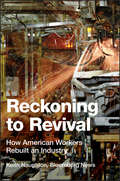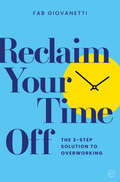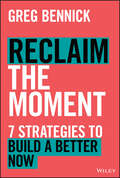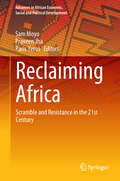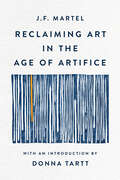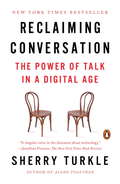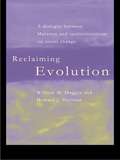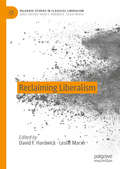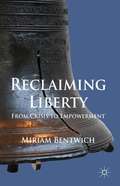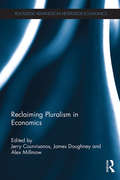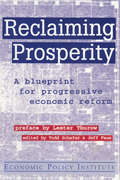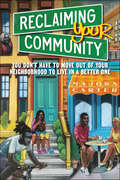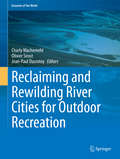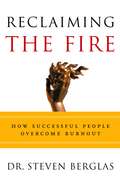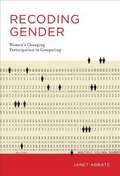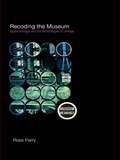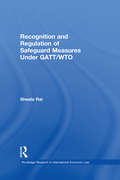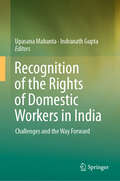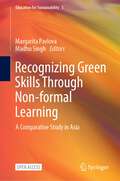- Table View
- List View
Reckoning to Revival: How American Workers Rebuilt an Industry
by Keith NaughtonA special report on the resurgence of the Detroit auto industry using the Chrysler Jeep plant at Jefferson North as a focal point. The report centers on the characters behind the plant and the new technology it is using for manufacturing cars, while also looking at the economic desperation of the neighborhood in which the Jeep plant sits.
Reclaim Your Time Off: The 3-step Solution to Overworking
by Fab GiovanettiA practical toolkit for thriving in the modern working environment, by a popular wellness entrepreneur and business coach.Multi-hyphen careers and remote working have now become the norm in working culture. Does "flexible working" mean "always working"? What does work-life balance actually look like? This book offers practical steps to managing remote and flexible work coexisting in the same space as life. Reclaim Your Time Off offers: • Fab's unique 3-step solution: Simplify, Delegate, Automate. • Regular "Action Steps" and coaching activities to help you see and understand current patterns and reasons for overwhelm, and turn them around. • Practical strategies to learn how to rest and work smarter.In the current working landscape, we work really hard. On average, over 60 hours per week. "Burnout" is a ubiquitous buzzword. Being overly busy is a badge of honour. This book uncovers how "busyness" can impact negatively on creativity. We need to relearn the art of being bored. Down time is an essential part of productivityand a vital component in good health and wellbeing. This book shows us how to protect it.
Reclaim the Moment: Seven Strategies to Build a Better Now
by Greg BennickAn inspiring new exploration of how to maximize your life, your work, and your productivity In Reclaim the Moment: Seven Strategies to Build A Better Now, internationally recognized speaker and author Greg Bennick delivers a practical and inspiring take on improving focus and enhancing peak performance for individuals and teams. The approach is fun and energetic, offering fresh ideas for generating authentic motivation. In the book, you'll find hands-on advice on how to revitalize and energize both yourself and your team using the author's unique combination of seven time-tested, and thoroughly researched, principles. From the alluring idea to “Keep Your Eyes on the Knife” as a reminder about the importance of focus, to a call to “Leap Into the Dark” as a guide to explore creative leadership and explore new ideas, to an invitation on “Start a Reverberation Effect™” as a means of amplifying your vision, the book offers solid approaches for peak performance. You'll discover how to strengthen teams, lead with direction, and to escape pessimism and self-doubt as you and the people around you learn to Build a Better Now. You'll also find: Personal and true stories drawn from the author's remarkable life and career Evidence-backed insights taken from contemporary sociology, cultural anthropology, and futurist literature Strategies to encourage the taking of joyful risks and increasing the amount of laughter and happiness in your life and the lives of the people you encounter Perfect for executives, managers, directors, and other business leaders, Reclaim The Moment is also a must-read resource for anyone seeking to build genuine inspiration, productivity, and connection in themselves and in the teams they work with.
Reclaiming Africa: Scramble and Resistance in the 21st Century (Advances in African Economic, Social and Political Development)
by Sam Moyo Praveen Jha Paris YerosThis book presents the findings of research conducted by scholars and activists associated with the Agrarian South Network, based mainly in Africa, Asia and Latina America. The research articulates a Southern perspective on the “new scramble” for Africa, with a view to strengthen tri-continental solidarities. The book explains the significance of the new scramble in terms of the economic structures inherited from the late-nineteenth-century scramble and the subsequent post-independence period. The renewed competition for Africa’s land and natural resources and the resumption of economic growth at the turn of the millennium have revived concerns regarding the continent’s position in the world economy and the prospects for its development in the twenty-first century. In this regard, the book addresses two related issues: the character of the expansion of Southern competitors in relation to the more established Western strategies; and the impact of the renewed influx of investments in land, minerals, and associated infrastructure. The findings are presented with empirical rigor and conceptual clarity, to enable the reader to grasp what really is at stake in the twenty-first century – an epic struggle to reclaim Africa from the monopolies that exercise control over its land, minerals, labour, and destiny.
Reclaiming Art in the Age of Artifice
by J.F. MartelA compelling call to rediscover the transformative power of art in an age of distraction, coercion, and spectacle – featuring an introduction from Pulitzer Prize–winning author Donna Tartt In Reclaiming Art in the Age of Artifice, J. F. Martel offers a compelling and incisive meditation on the nature of art in a world dominated by invasive media, rampant consumer culture, and artificial intelligence. Drawing on a wide range of examples, from Paleolithic cave art to contemporary cinema, Martel argues that true art reveals the unseen forces shaping our existence—forces that transcend politics, technology, and even culture. In contrast to artifice, which seeks to manipulate or distract, authentic art calls us back to the essence of things, opening &“rifts&” onto the sublime and the weird and reconnecting us with the radical mystery at the heart of the world. Featuring an introduction by Pulitzer Prize–winning author Donna Tartt, this edition also includes a new afterword by the author, reflecting on the continued relevance of art in our increasingly mediated world.
Reclaiming Conversation: The Power of Talk in a Digital Age
by Sherry TurkleRenowned media scholar Sherry Turkle investigates how a flight from conversation undermines our relationships, creativity, and productivity--and why reclaiming face-to-face conversation can help us regain lost ground.We live in a technological universe in which we are always communicating. And yet we have sacrificed conversation for mere connection. Preeminent author and researcher Sherry Turkle has been studying digital culture for over thirty years. Long an enthusiast for its possibilities, here she investigates a troubling consequence: at work, at home, in politics, and in love, we find ways around conversation, tempted by the possibilities of a text or an email in which we don't have to look, listen, or reveal ourselves. We develop a taste for what mere connection offers. The dinner table falls silent as children compete with phones for their parents' attention. Friends learn strategies to keep conversations going when only a few people are looking up from their phones. At work, we retreat to our screens although it is conversation at the water cooler that increases not only productivity but commitment to work. Online, we only want to share opinions that our followers will agree with - a politics that shies away from the real conflicts and solutions of the public square. The case for conversation begins with the necessary conversations of solitude and self-reflection. They are endangered: these days, always connected, we see loneliness as a problem that technology should solve. Afraid of being alone, we rely on other people to give us a sense of ourselves, and our capacity for empathy and relationship suffers. We see the costs of the flight from conversation everywhere: conversation is the cornerstone for democracy and in business it is good for the bottom line. In the private sphere, it builds empathy, friendship, love, learning, and productivity. But there is good news: we are resilient. Conversation cures. Based on five years of research and interviews in homes, schools, and the workplace, Turkle argues that we have come to a better understanding of where our technology can and cannot take us and that the time is right to reclaim conversation. The most human--and humanizing--thing that we do. The virtues of person-to-person conversation are timeless, and our most basic technology, talk, responds to our modern challenges. We have everything we need to start, we have each other.
Reclaiming Evolution: A Dialogue Between Marxism And Institutionalism On Social Change
by William Dugger Howard J. ShermanHoward Sherman and William M. Dugger engage in a dialogue on social evolution from Institutionalist and Marxist perspectives, each representing one side. Together they explore the way society develops using the equally radical, but very different approaches of Thorstein Veblen and Karl Marx.
Reclaiming Liberalism (Palgrave Studies in Classical Liberalism)
by Leslie Marsh David F. Hardwick“David Hardwick and Leslie Marsh have assembled a contentious collection of independent thinkers on liberalism’s identity and prospects. Should liberalism be democratic, classical, ordo, legalistic, culture-based, market-based, or what? The international crew of authors—from Australia, Canada, China and the USA—draw upon the insights of key historic figures from Locke to Montesquieu to Burke to Dewey to Hayek to Rawls (and of course others, given liberalism’s rich history), and they leave us with a set of liberalisms both in collision and in overlapping agreement. This book is stimulating reading for those engaged with next-generation liberal thought.”—Stephen R. C. Hicks, Professor of Philosophy at Rockford University.This collection redresses the conceptual hubris and illiteracy that has come to obscure the central presuppositions of classical liberalism - that is, the wresting of epistemic independence from overwhelming concentrations of power, monopolies and capricious zealotries, whether they be statist, religious or corporate in character.
Reclaiming Liberty
by Miriam BentwichBased on a reconstruction of earlier liberal conceptions of liberty (the political theories of John Locke & J. S. Mill), this book stresses the empowering nature of liberal freedom and explains why such a concept of liberty better addresses two key contemporary challenges in liberal theory and praxis: wealth redistribution and multiculturalism.
Reclaiming Pluralism in Economics (Routledge Advances in Heterodox Economics)
by Jerry Courvisanos James Doughney Alex MillmowUntil the end of the early 1970s, from a history of economic thought perspective, the mainstream in economics was pluralist, but once neoclassical economics became totally dominant it claimed the mainstream as its own. Since then, alternative views and schools of economics increasingly became minorities in the discipline and were considered ‘heterodox’. This book is in honour of John Edward King who has an impressive publication record in the area of economic theory with specific interest in how economic thought in the past shapes current economic theory and enforces certain paths of economic policy and economic development. This book is divided into five themes based on King’s interests. The first theme looks at the challenge in trying to reclaim pluralism in economics. The second faces head-on the direct collision of mainstream economics with history of economic thought and heterodox economics. The third addresses classical economic ideas, their central influence in the past and how they can still primarily guide modern pluralist economics. The fourth examines Post Keynesian and Kaleckian economics with a view to providing a more coherent and extensive branch of heterodox economics. The final theme critiques the policy of neoliberalism that has entrenched itself in capitalist economies which have led to financial, industrial, labour, and behavioural/consumerist crises. This text aims to provide a clear path for pluralism to serve the economics discipline as its standard bearer, and to no longer be merely a heterodox challenge to the mainstream. This book is of interest to those who study history of economic thought, political economy and heterodox economics.
Reclaiming Prosperity: Blueprint for Progressive Economic Policy (Economic Policy Institute Ser.)
by Todd Schafer Jeff FauxThis work presents a predicted summary of major economic challenges facing the United States in the last years of the 20th century. Intended to shape the platforms of the major parties and the general public, it contains proposals by leading specialists aimed at resolving such challenges.
Reclaiming Your Community: You Don’t Have to Move out of Your Neighborhood to Live in a Better One
by Majora CarterMajora Carter shows how brain drain cripples low-status communities and maps out a development strategy focused on talent retention to help them break out of economic stagnation. "My musical, In the Heights, explores issues of community, gentrification, identity and home, and the question: Are happy endings only ones that involve getting out of your neighborhood to achieve your dreams? In her refreshing new book, Majora Carter writes about these issues with great insight and clarity, asking us to re-examine our notions of what community development is and how we invest in the futures of our hometowns. This is an exciting conversation worth joining.” —Lin-Manuel Miranda How can we solve the problem of persistent poverty in low-status communities? Majora Carter argues that these areas need a talent-retention strategy, just like the ones companies have. Retaining homegrown talent is a critical part of creating a strong local economy that can resist gentrification. But too many people born in low-status communities measure their success by how far away from them they can get. Carter, who could have been one of them, returned to the South Bronx and devised a development strategy rooted in the conviction that these communities have the resources within themselves to succeed. She advocates measures such as • Building mixed-income instead of exclusively low-income housing to create a diverse and robust economic ecosystem • Showing homeowners how to maximize the long-term value of their property so they won't succumb to quick-cash offers from speculators • Keeping people and dollars in the community by developing vibrant “third spaces”—restaurants, bookstores, and places like Carter's own Boogie Down Grind Cafe This is a profoundly personal book. Carter writes about her brother's murder, how turning a local dumping ground into an award-winning park opened her eyes to the hidden potential in her community, her struggles as a woman of color confronting the “male and pale” real estate and nonprofit establishments, and much more. It is a powerful rethinking of poverty, economic development, and the meaning of success.
Reclaiming and Rewilding River Cities for Outdoor Recreation (Estuaries of the World)
by Olivier Sirost Jean-Paul Ducrotoy Charly MachemehlThe introduction of sports and recreational facilities into natural environments calls for reflection on their impact on fragile ecosystems. This book is unique in providing an interdisciplinary approach to the ecological restoration of urban and industrial degraded habitats and their use by nearby city-dwellers. For the first time ecologists, sociologists and anthropologists have worked together on particularly sensitive ecosystems such as rivers and estuaries to propose recovery strategies that allow their basic ecological functions to be restored, and which can benefit local populations through nature activities.Nonetheless, the use of natural spaces calls for the building of sustainable towns. This is why this book is distinctive in considering quality of life and well-being as stated objectives of modern river towns. Recently, leisure time has become a part of urban rhythms. In order to favour personal development, an extensive palette of leisure activities is considered by the authors:bird watchingentertainmentsportscultureMany aspects including physical and psychological attributes in relation to the contemporary socio-political fabric are dealt with.While creating areas of freedom, landscaping also induces certain forms of practice and encourages certain social skills. Conversely, the book questions certain types of management based on mass consumption. Don’t they, in the end, aim to satisfy needs that are impermanent and shallow? The image of the contemporary town relies on urban planning projects which, in a global economy, seek to capture the interest of tourists and local populations. How can suitable, diligent planning be successfully combined with both creative design and ecological care? This book demonstrates how biology and sociology can (and should) work in harmony in order to promote an ecosystem approach to environmental management.
Reclaiming the Fire: How Successful People Overcome Burnout
by Steven BerglasThe definitive work on avoiding burnout, written by the psychologist who is the leading specialist on the issue. An illuminating and useful book for anyone coping with the pressures of work.In Reclaiming the Fire, Dr. Steven Berglas analyzes the rises and falls of corporate executives, middle managers, lawyers, entrepreneurs, and others as they struggle to handle the trappings of successful careers. How does one deal with encore anxiety, the monotony of having to use talents that are no longer psychologically rewarding? Why is it that our national obsession with wealth traps people in careers that often lead them to wonder, "Is that all there is?" And why do highly successful people often set themselves up for disastrous falls?Dr. Berglas answers all these questions and many more in this groundbreaking book by discussing real people whose careers have left them feeling pressured, burdened, and jaded.In his most progressive and striking contribution to the literature on career success, Dr. Berglas debunks the persistent myth that women suffer more stress and burnout than men. He disproves the common claim that women involved both in careers and in family life suffer from trying to have it all, and he demonstrates how the drive to form close interpersonal ties a drive that is intrinsic to women can actually prevent both men and women from experiencing burnout. In a related analysis of the mentoring process, Dr. Berglas shows why it is more important for careerists to build legacies for future generations (a process he terms generativity) than to become obsessed with their own personal success. He proves that the process not only benefits the student but provides the mentor with psychological satisfaction and even improved physical health.Reclaiming the Fire uses the working world not the psychiatric couch as a venue for understanding the psychological and emotional burdens of success. It is the first comprehensive account of how to balance self-esteem and ambition while maintaining challenge and stimulation throughout your career. Reclaiming the Fire provides insight into: * Why baby boomers are currently suffering an epidemic of career dissatisfaction * Why women are uniquely suited to cope with the pressures that cause men to suffer burnout, and what men can learn from them * How to escape golden handcuffs: the workaholic devotion to a job that is no longer emotionally satisfying * How to cope with anger that threatens to sabotage your career * How all professionals can identify the passions that will allow them to sustain and enjoy success throughout their lives.
Reclaiming the Land of Purple: Purpl's Mission to Unlock Finance in Lebanon
by Lauren H. Cohen Grace HeadingerKarl Naim, Co-Founder and CEO of Purpl, embarked on a venture to lower remittance costs for his native Lebanon. Since October 2019, the Lebanese economy had entered a free fall as its banking sector collapsed and large swathes of its population were plunged into poverty. As a repeat technology entrepreneur, Naim alongside his two co-founders decided to launch a new remittance aggregator to improve access to low-cost remittances, which acted as a lifeline for most local families. By becoming a fiat-to-fiat aggregator and eventually leveraging stablecoin technology, he expected that in the first phase he could cut remittance fees in half from 9-12% to 5-6% -- and eventually up to 1%. With the Lebanese population's trust in financial and banking institutions shattered, could Purpl succeed in its mission? How could it convince its potential users, the broader Lebanese public and the 20 million-strong Lebanese diaspora around the world, to adopt a different way of sending and transacting with digital cash? For primary remittance users, who only needed to reliably receive a monthly $100-$200 for basic goods and other necessities, could Purpl convince them both to change their habits and to trust the financial system that had put them in this situation in the first place? Moreover, given Purpl's ultimate goal to upend the current establishment, would its "playing nice" with current established institutions haunt the firm's "anti-establishment" credibility from ever materializing?
Recoding Gender
by Janet AbbateToday, women earn a relatively low percentage of computer science degrees and hold proportionately few technical computing jobs. Meanwhile, the stereotype of the male "computer geek" seems to be everywhere in popular culture. Few people know that women were a significant presence in the early decades of computing in both the United States and Britain. Indeed, programming in postwar years was considered woman's work (perhaps in contrast to the more manly task of building the computers themselves). In Recoding Gender, Janet Abbate explores the untold history of women in computer science and programming from the Second World War to the late twentieth century. Demonstrating how gender has shaped the culture of computing, she offers a valuable historical perspective on today's concerns over women's underrepresentation in the field. Abbate describes the experiences of women who worked with the earliest electronic digital computers: Colossus, the wartime codebreaking computer at Bletchley Park outside London, and the American ENIAC, developed to calculate ballistics. She examines postwar methods for recruiting programmers, and the 1960s redefinition of programming as the more masculine "software engineering." She describes the social and business innovations of two early software entrepreneurs, Elsie Shutt and Stephanie Shirley; and she examines the career paths of women in academic computer science. Abbate's account of the bold and creative strategies of women who loved computing work, excelled at it, and forged successful careers will provide inspiration for those working to change gendered computing culture.
Recoding the Museum: Digital Heritage and the Technologies of Change (Museum Meanings)
by Ross ParryWhy has it taken so long to make computers work for the museum sector? And why are museums still having some of the same conversations about digital technology that they began back in the late 1960s? Does there continue to be a basic ‘incompatibility’ between the practice of the museum and the functions of the computer that explains this disconnect? Drawing upon an impressive range of professional and theoretical sources, this book offers one of the first substantial histories of museum computing. Its ambitious narrative attempts to explain a series of essential tensions between curatorship and the digital realm. Ultimately, it reveals how through the emergence of standards, increased coordination, and celebration (rather than fearing) of the ‘virtual’, the sector has experienced a broadening of participation, a widening of creative horizons and, ultimately, has helped to define a new cultural role for museums. Having confronted and understood its past, what emerges is a museum transformed – rescripted, re calibrated, rewritten, reorganised.
Recognition and Enforcement of Foreign Arbitral Awards
by George A. BermannThe Guide on the Convention on the Recognition and Enforcement of Foreign Arbitral Awards provides a detailed analysis of the judicial interpretation and application of the New York Convention by reference to case law from 45 Contracting States. The Guide, and the newyorkconvention1958. org website which supplements it, will become an essential tool that benefits all those involved in the interpretation and application of the New York Convention, including judges, arbitrators, practitioners, academics and Government officials. The Guide gives clear expression to the principal finding of our research, namely, that the Contracting States have interpreted and applied the New York Convention in an overwhelmingly consistent manner and that courts have diverged from the general trends in the case law in only isolated instances. As such, the Convention continues to fulfill its purpose of facilitating the worldwide recognition and enforcement of arbitral awards to the greatest extent possible.
Recognition and Regulation of Safeguard Measures Under GATT/WTO (Routledge Research in International Economic Law)
by Sheela RaiThis book discusses the law of safeguard measures as laid down in the WTO agreements and cases decided by the Panel and the Appellate Body. It sets out a comprehensive treatment of safeguard measures covering the history and evolution of the law, as well as the procedural requirements and the application of safeguard measures. In addition to measures under Article XIX and the Safeguards Agreement, the book includes coverage of safeguard measures for agricultural products, Special Safeguard Measures for developing countries, safeguard measures for textiles and proposed safeguard measures under General Agreement on Trade in Services (GATS) as well as special safeguard clauses against China. Recognition and Regulation of Safeguard Measures Under GATT/WTO considers safeguards from a developing country’s perspective drawing on Joseph E. Stiglitz’s argument that developing countries require these trade remedy measures to protect their domestic industries and ensure their development. Sheela Rai considers this view and goes on to examine how beneficial the provisions relating to safeguard measures and their interpretation given by the Panel and Appellate Body have been for developing countries.
Recognition of the Rights of Domestic Workers in India: Challenges and the Way Forward
by Indranath Gupta Upasana MahantaThis book brings together a set of contributions that examine the complexities associated with domestic work by highlighting not only the legal issues but also exploring the social, psycho-social, economic, and cultural dimensions of domestic work. The book aims to ignite a collective effort towards ensuring decent work for domestic workers and facilitate a public debate on their rights. It includes discussions on the issue of social justice with special emphasis on invisibilization and undervaluation of domestic work, feminization of domestic work, and recognizes the rights of domestic workers as human rights. The issues covered in this book bridge the gap between legal and social dimensions of domestic work and address the discrimination faced by domestic workers in a holistic manner. Given its scope, the book would appeal to both academics (law as well as social science) and non-academics. It will be a useful tool for teachers, students, practitioners, policy-makers and civil society organizations working for the unorganized sector.
Recognizing Green Skills Through Non-formal Learning: A Comparative Study in Asia (Education for Sustainability #5)
by Madhu Singh Margarita PavlovaThis open access book looks into the roles and practices of small and micro-enterprises in formal and informal economies across seven countries and one territory in terms of how they contribute to environmental and sustainable development and green skills promotion. By taking into account the perspectives in these four sectors, catering, automotive, waste management and polyvinyl chloride production, this book maps environmental green practices in the region, identifying mechanisms used to assess existing skills (i.e. knowledge, skills and competencies), and evaluating the potential for green skills inclusion in recognition, validation and accreditation.
Recognizing Lock-In: How to Leverage Switching Costs
by Hal R. Varian Carl ShapiroThis chapter explains how to value an installed base of customers and describes the common types of consumer and supplier lock-in and their associated switching costs. It examines the effectiveness of such lock-in strategies as contractual agreements, brand-specific training, and customer loyalty programs.
Recognizing Opportunities: Innovator as Entrepreneur
by Harvard Business Review PressMost innovative ideas are fun and interesting. But from a crowded field, how can you recognize an idea that has real business potential? Opportunity recognition is a mental process that can help you make this assessment. This chapter gives you the tools you need to decide whether to invest in a new idea.
Recognizing Revenues and Expenses: Realized and Earned
by Robert S. KaplanDescribes a key concept in financial accounting: choosing an appropriate revenue recognition point. The accrual process requires revenue recognition and expense matching for reporting on the value creation process of companies. Describes the two key criteria for revenue recognition--realized and earned--and the conditions that must be met to satisfy these criteria. The use of the typical recognition point, when the product or service is delivered to the customer, is discussed as well as situations (e.g., the percentage of competition method) when revenue can be recognized before actual delivery. A rewritten version of an earlier note.
